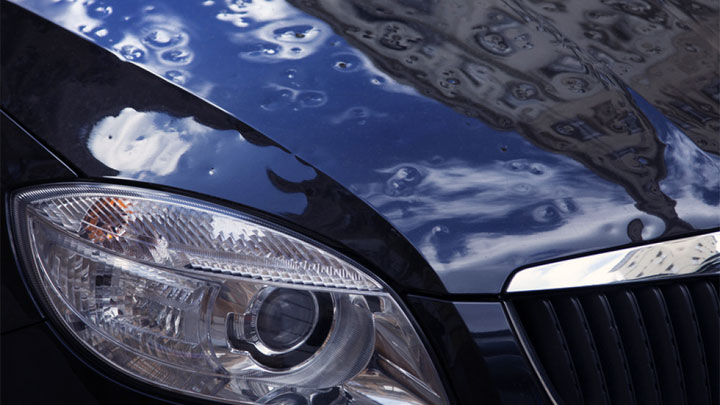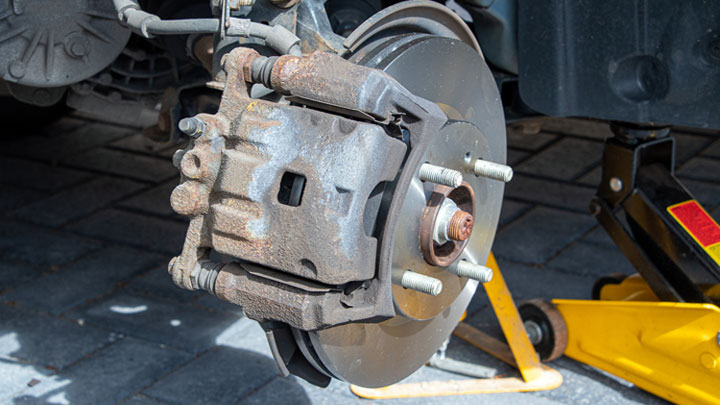Last Updated on November 2, 2022
There are two seasons in the life of your car, truck, or SUV where the interior can smell bad. The first may occur following several years of smell-free ownership. The second may take place immediately following purchase if you have bought a pre-owned vehicle.
In either case, the result is the air coming from your vehicle’s A/C system smells bad and understanding the causes and corrective measures can be beneficial. In this article we hope to cover this ground on your behalf.
Air Conditioning and Its Operation
Your automobile’s air conditioning system is often called the climate control system (CCS). On a modern car, this system will operate continuously when the engine is running (electric cars excepted). This is similar to a car’s HVAC system but more complex with its ability to automatically maintain a desired temperature setting.
When operating, the CCS generally draws outside air into the system and either heats that air or cools it, dehumidifies it, then pushes it into the car’s cabin. Quite nice in the bitter cold of winter or the scorching days of summer.
Most cars today incorporate an air filter in this system. This helps remove dust, pollen, and insects from the air before it enters the car’s interior. The filter element will gradually fill with particulates and will need to be periodically cleaned or replaced.
When you select the recirculation mode on your CCS, it will close the outside air vent and recirculate the air inside the car. For many modern cars, recirculation mode will automatically discontinue after a short time.
The outside air vent will then reopen to draw in fresh air. This ensures that a reasonable amount of fresh air circulation occurs as you drive.
See Also: 4 Signs You’re A/C System is Low on Refrigerant
Types of Smells from the Climate Control System

The following smells may be noted in your car whether it is a few years old or even if you have just purchased it (pre-owned).
Here are six kinds of bad smells you might experience:
- A mildew, musty or vinegar (sour) odor. Or possibly an odor like a wet dog. Think of the smell of old socks or a damp t-shirt left unwashed on the basement floor for a week or two.
- The smell of engine antifreeze or oil.
- Engine exhaust and/or rotten egg smell.
- The smell of gasoline or diesel fuel.
- A burning smell.
- Cigarette or cigar smoke odor.
Note that several of these smells may exist inside your car but not in the CCS. Notably musty odors and the odor of cigarette/cigar smoke can fall into this category.
Why Does My Car A/C Smell Bad?
#1 – Mildew, Musty, or Vinegar Smell

This smell can originate at the cabin air filter, within the climate control system evaporator coil, and/or within the system ducts.
Because the CCS removes moisture from the air, that moisture in a dark environment may encourage the growth of mold or mildew. Such organic growth can produce the smell described here. The older the car the more likely this condition will develop.
These odors can also develop in the car’s upholstery, carpeting and floor mats. Excess moisture inside any car can cause this to occur, especially in rainy or wintry climates.
#2 – Antifreeze or Oil Smell
Antifreeze and/or oil can leak under the hood. When this happens the associated odors can be picked up by the CCS air inlets located in front of the windshield and be conveyed inside the car.
Also an antifreeze leak in the CCS heater coil can bring a significant antifreeze odor into the cabin. With a heater coil leak, antifreeze may be observed dripping into the right or left front footwell.
#3 – Engine Exhaust or Rotten Egg Smell

Engine exhaust can be conveyed by the CCS air inlet into the cabin when you first start your car.
A rotten eggs smell (hydrogen sulfide) can accompany the car’s exhaust when the catalytic converter is not operating properly. Like engine exhaust, this odor can be picked up by the CCS air inlet.
#4 – Gasoline or Diesel Fuel Smell
Gasoline or diesel fuel odors can enter the car cabin due to fuel leaks at the engine, fuel lines or tank. While smelling fuel outside of your vehicle can be serious, smelling it inside the cabin should be a definite cause for concern and something you need to address right away.
#5 – Burning Smell

Burning odors can likewise enter the cabin. Those that originate from the engine area will be picked up by the CCS inlets in front of the windshield. But even smells that originate from a wheel area (ie: brakes) can makes their way into interior of the vehicle.
#6 – Cigarette or Cigar Smell
Cigarette/cigar smoke odors can become established in any car where folks smoke, even occasionally. The airborne chemicals from smoking will accumulate on the interior surfaces of the cabin.
And when the CCS is set to recirculate, the odor causing deposits can settle into the CCS ducts and coils.
See Also: How to Remove Skunk Smell From Your Car
Key Steps to Minimize Bad Odors in Your Car
Before we get into attacking and resolving foul odors, are there ways to minimize the risk of these bad smells from happening? For the most part, the answer is, yes. If your car smells fresh today, taking these steps can keep it that way for many years.
Tip #1 – Always run the CCS
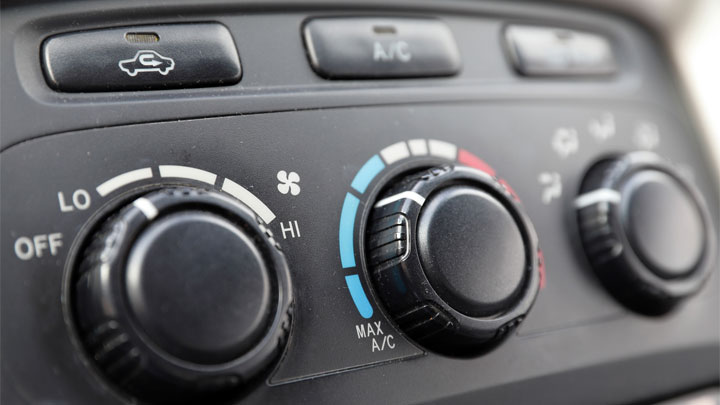
Always run the climate control system when you drive your vehicle. Many owners shut that system off thinking they will conserve some energy.
Yes, you might save a few bucks a year, but fresh air constantly flowing through your car while driving can keep the cabin aired out and dry. And this will help minimize mold and mildew from developing in the CCS and inside the car.
Tip #2 – Park in Sunny Spots
When parking outdoors, choose a spot in the sun, not the shade. Sunlight is the enemy of mold and mildew. Avoiding shady parking areas can help reduce the growth of these odor causers inside your car’s cabin.
Tip #3 – Minimize the Use of Recirculation Feature

This is a nice feature to have when you’re driving out in a rural area and approaching a dairy farm or you want to quickly cool or warm the interior.
But it inhibits the flow of fresh outside air through your car and this can promote mold and mildew growth.
Tip #4 – If You Smoke, Crack Open Windows
If you must smoke, do so with the windows cracked open to vent smoke to the great outdoors. While some smoke will still be absorbed by various interior surfaces, it will be much worse if the smoke has no place to escape.
Tip #5 – Dry Out Floor Mats
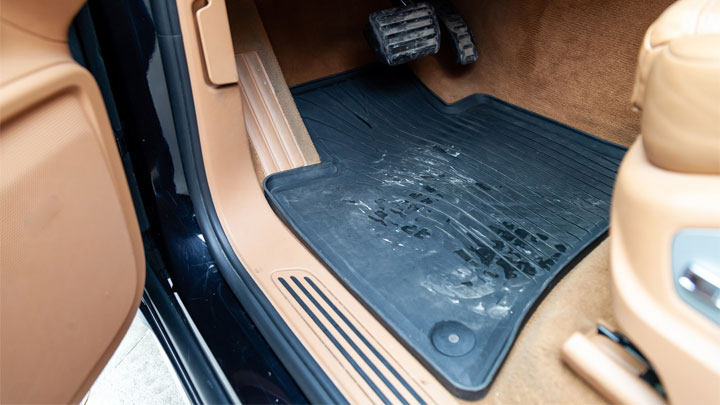
In wet or snowy weather, remove the floor mats if they are water or snow soaked and allow them to dry overnight. Wet mats just sitting in the cabin’s footwells can breed smelly mold and mildew. Dry mats will have far less tendency to do this.
Tip #6 – Get Fluid Leaks Fixed ASAP
Leaking antifreeze, oil, or fuel (gas or diesel) will leave a telltale odor around your car when it sits in the garage overnight. Should you detect these smells when you go out to start your car, get the vehicle checked out by a qualified technician as soon as possible.
Keep in mind that leaking fuel can be a significant fire hazard. Constant exhaust odors also pose a health hazard inside the car and should be evaluated for cause and corrected.
Tip #7 – Replace Your Cabin Air Filter
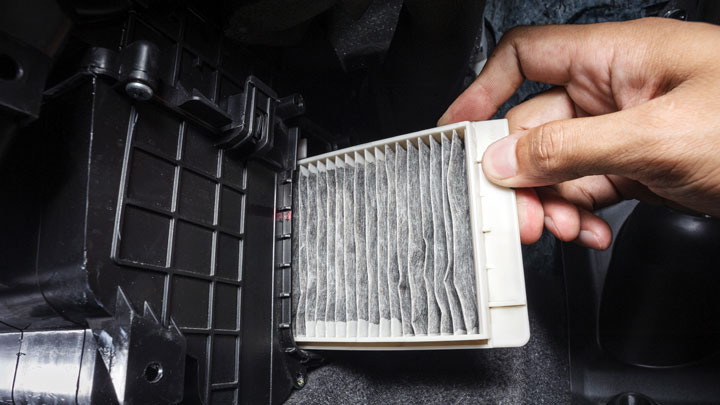
Follow your manufacturer’s instructions for the periodic replacement of your cabin air filter. This should typically be done on an annual basis. Tossing an old filter may eliminate an unseen but developing mold or mildew source.
New elements can be purchased from your dealer or at most auto parts stores. Refer to your owners manual for more information about this filter and the recommended frequency of replacement.
How to Get Rid of Smells from Your Car A/C
To purge bad smells from your vehicle’s climate control system, the cabin air filter should be replaced and the system will need to be cleaned. Here are two common methods for cleaning your car’s CCS.
#1 – Use an Air Conditioner Cleaner
The first is to use any one of the several automobile air conditioning cleaning sprays available online or from your local parts store. German-made Nextzett Klima Cleaner Pro is arguably the best while Armor All Freshfx is a good inexpensive option.
Such specialized sprays can be applied through the air inlet and/or the inside duct outlets followed by system operation to distribute the product through the ducts and coils. Always follow the manufacturer’s directions.
#2 – Clean the Evaporator Coil
The second requires a partial disassembly of your car’s climate control or HVAC system to expose the evaporator coil. Typically this will necessitate removal of the fan housing and fan assembly.
This could be a complex process well beyond the skill of the average DIYer. But if you head down this path, you can use one of the several available mold/mildew removing sprays. The process involves applying the cleaning product directly to the exposed evaporator coil. Follow the manufacturer’s directions.
Either of these treatments may require several applications over a period of time to fully correct the odor problem.
How to Get Rid of Car Interior Smells
Here the use of an aerosol deodorizing product made specifically for this purpose is advised. Meguiar’s Air Re-Fresher is an excellent option. Most such products are used in this fashion:
- Choose a warm dry day. Park your car outdoors, close the windows and run the engine with the CCS set for recirculation.
- Place the deodorizing container inside the car. Latch the aerosol nozzle open to dispense the chemical throughout the car. Exit the car, close the doors and allow the product to dispense.
- When this process is complete, ventilate the car with windows down and CCS running. When complete, this process may necessitate wiping down the interior and cleaning the car windows. Always follow the manufacturer’s instructions and usage warnings.
Several repeats of this process may be needed to resolve particularly bad car interior smells.


